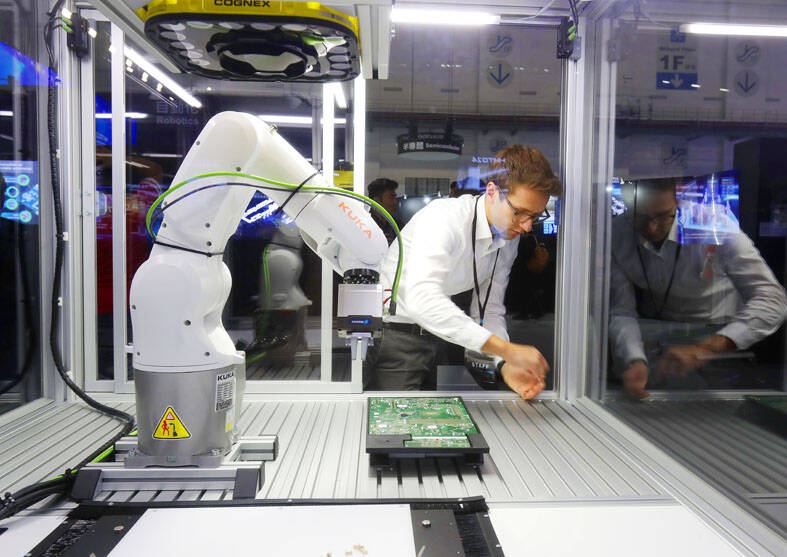The industrial production index expanded 8.85 percent annually to 100.6 last month as robust demand for artificial intelligence (AI) applications and high-performance computing (HPC) devices fueled demand for advanced chips and data centers, the Ministry of Economic Affairs said yesterday.
The index measures the change in the value of output produced by the local manufacturing, mining and utilities sectors, with the manufacturing output, the major pillar of industrial production, growing 9.32 percent year-on-year to 100.51 last month.
Industrial and manufacturing production registered an eighth consecutive month of annual growth last month.

Photo: Chiang Ying-ying, AP
During the first 10 months of this year, industrial production and manufacturing production grew 10.68 percent and 11.11 percent from the same period last year respectively.
“It looks like manufacturing production is on track to grow for the whole of this year, ending two consecutive years of decline,” Department of Statistics Deputy Director-General Huang Wei-jie (黃偉傑) said by telephone yesterday. “The outlook for the first quarter of next year remains unclear. A major uncertainty is the US trade policies under [US president-elect] Donald Trump. We are closely monitoring how it will play out.”
This month, manufacturing production is expected to climb between 5.8 percent and 10.1 percent annually to between 98.08 and 102.08, the ministry forecast.
On a sequential basis, manufacturing production would shrink 2.4 percent in the worst-case scenario due to a disappointing recovery of the traditional sectors, which were affected by China’s economic slowdown and industrial overcapacity, Huang said.
Among the six major industries in the manufacturing sector, three posted an annual output expansion last month, with the electronic components industry reporting the largest increase of 16.47 percent, benefiting from rising demand for HPC and AI devices, which boosted demand for 12-inch wafers, chip design and chip testing and packaging services, the ministry said.
The production of computers and optical products last month rose 4.35 percent annually, thanks to sustained demand for AI applications and semiconductor inspection equipment, the ministry said.
Machinery equipment production expanded 11.06 percent last month, buoyed by robust equipment demand from semiconductor companies.
Demand for machine tools remained sluggish as slower global economic growth depressed firms’ investment in manufacturing equipment, it said.
The production of base metals contracted 3.52 percent last month due to sluggish steel demand worldwide and low-priced steel products from China, the ministry said.
The production of chemical materials and fertilizers dipped 5.01 percent last month as manufacturers cut production to cope with sagging demand. The decline was also a result of disruptions by typhoons last month, it added.
The production of automotive products plummeted 12.59 percent last month, attributable to component shortages and competition from global automakers, the ministry said.

When an apartment comes up for rent in Germany’s big cities, hundreds of prospective tenants often queue down the street to view it, but the acute shortage of affordable housing is getting scant attention ahead of today’s snap general election. “Housing is one of the main problems for people, but nobody talks about it, nobody takes it seriously,” said Andreas Ibel, president of Build Europe, an association representing housing developers. Migration and the sluggish economy top the list of voters’ concerns, but analysts say housing policy fails to break through as returns on investment take time to register, making the

‘SILVER LINING’: Although the news caused TSMC to fall on the local market, an analyst said that as tariffs are not set to go into effect until April, there is still time for negotiations US President Donald Trump on Tuesday said that he would likely impose tariffs on semiconductor, automobile and pharmaceutical imports of about 25 percent, with an announcement coming as soon as April 2 in a move that would represent a dramatic widening of the US leader’s trade war. “I probably will tell you that on April 2, but it’ll be in the neighborhood of 25 percent,” Trump told reporters at his Mar-a-Lago club when asked about his plan for auto tariffs. Asked about similar levies on pharmaceutical drugs and semiconductors, the president said that “it’ll be 25 percent and higher, and it’ll

CHIP BOOM: Revenue for the semiconductor industry is set to reach US$1 trillion by 2032, opening up opportunities for the chip pacakging and testing company, it said ASE Technology Holding Co (日月光投控), the world’s largest provider of outsourced semiconductor assembly and test (OSAT) services, yesterday launched a new advanced manufacturing facility in Penang, Malaysia, aiming to meet growing demand for emerging technologies such as generative artificial intelligence (AI) applications. The US$300 million facility is a critical step in expanding ASE’s global footprint, offering an alternative for customers from the US, Europe, Japan, South Korea and China to assemble and test chips outside of Taiwan amid efforts to diversify supply chains. The plant, the company’s fifth in Malaysia, is part of a strategic expansion plan that would more than triple

Taiwanese artificial intelligence (AI) server makers are expected to make major investments in Texas in May after US President Donald Trump’s first 100 days in office and amid his rising tariff threats, Taiwan Electrical and Electronic Manufacturers’ Association (TEEMA, 台灣電子電機公會) chairman Richard Lee (李詩欽) said yesterday. The association led a delegation of seven AI server manufacturers to Washington, as well as the US states of California, Texas and New Mexico, to discuss land and tax issues, as Taiwanese firms speed up their production plans in the US with many of them seeing Texas as their top option for investment, Lee said. The